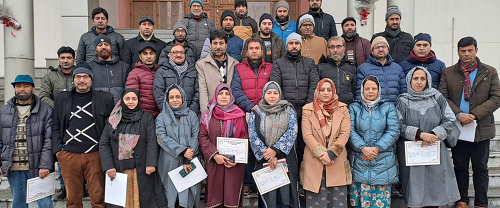[ad_1]
Dr. SAJAD HUSSAIN MIR
In consonance with Teacher Training Action Plan JKUT, 5 days capacity building workshop in Zoology at Sr. Secondary Level aimed at equipping Master Resource Persons (MRPs) at the Union Territory level in JKUT with the current developments and emerging trends involving the latest pedagogical skills ended on 20-01-2023. The aim of the programme was to ensure meaningful and conceptual based transition of knowledge and to acquaint them about the latest strategies, techniques, tools and methodologies of teaching Zoology at Sr. Secondary level.
The training programme was attended by 40 lecturers (4 lecturers from each District) across Kashmir Division. The entire programme was divided into 10 sessions and each session was of 2:30 hour’s duration. On day 1, Professor Tariq Abdullah from Education Multimedia Research Centre (EMMRC), University of Kashmir deliberated upon the ICT-based pedagogical practices in teaching of Zoology at Sr. Secondary level. He highlighted the ways and means of making the teaching learning process more effective, conducive, and holistic for the learners using latest technological interventions. The sessions created enthusiasm, innovative thinking and inquisitiveness among the learners.
On day 2, Professor Mushtaq Rasool Mir and Dr. Shabir Ahmad Bhat from the College of Temperate Sericulture (CTS), Mirgund (SKUAST-K) deliberated upon Sericulture and the diseases of Silkworm respectively with special focus on Mulberry silk. While reporting the current status of sericulture in Kashmir, Prof. Mushtaq Rasool stressed on the need of creating awareness among the cross sections of the society about the income augmenting and employment generating potential of Sericulture. Dr. Shabir Ahmad acquainted the participants about the different types of diseases that inflict damage to silkworm industry and the ways of managing diseases.
On day 3, Prof. (Dr.) Manzoor Ahmad Bhat, Head of Department, Radiation Oncology, Govt. Medical College Srinagar delivered a special lecture on cancer with focus on the treatment strategies particularly targeted therapies and use of monoclonal antibodies. Based on Cancer Registry Data, it is estimated that there are about 800,000 new cancers cases in India every year. While discussing the causative factors Prof. Manzoor Ahmad reported that District Srinagar in Kashmir Division outnumbers other districts in terms of cancer incidence. He emphasized on the role of teachers in creating awareness programmes among school going children regarding the harmful effects of smoking and other carcinogenic substances that are the sources of mutations and cause cancer. He reported that tobacco use is linked to at least 20 types of cancers and consumption of tobacco kills more than 8 million people globally every year. The second session on day 3 was conducted by Dr. Mehraj Bashir and Dr. Showkat Ahmad Malik, Assistant Professors, Govt. Degree College, Kupwara who delivered lectures on infertility and assisted reproductive technologies and the role of reproductive hormones. They discussed thoroughly the causative factors of infertility and the latest treatment options available for treating infertility. They created interest and conceptual clarity among the learners.
On day 4, Dr. Rouf Ahmad Mir, Senior Resident/Registrar, Department of Psychiatry, Institute of Mental Health and Neuroscience (IMHANS), Govt. Medical College (GMC) Srinagar deliberated upon Drug/Substance Abuse and its impact on the physical well being of an individual. The world Drugs Report 2020, reports that 269 million people who used drugs in the past year, some 35.6 million people are estimated to suffer from drug use disorders. Today there is no part of the world that is free from drug trafficking and drug addiction. He thoroughly discussed different psychoactive substances that alter Cognition, mood, consciousness and behavior in an individual.
While referring to Kashmir there is increase in hospital statistics for treatment seeking for substance abuse and the number of such patients has increased drastically from 489 (2016) to 3536 (2020). Among drug users, injectable drugs particularly injectable Heroin is predominantly used. He said that the daily expenditure on consumption of Opioids in two Districts of Srinagar and Anantnag is heart wrenching. Besides teaching, he stressed that the teachers being the torch bearers have a big role to play in creating awareness among the young students about the harmful effects of drugs. The second session of day 4 was highly interactive wherein Ms. Zoya Mir, Consultant Clinical Psychologist, Institute of Mental Health and Neuroscience (IMHANS), Govt. Medical College (GMC) Srinagar demonstrated the practical aspects of motivating the drug addict students for treatment/de-addiction. She thoroughly discussed the psychological aspects that can be used in boosting the stress-free learning environment among the school children.
On day 5, Dr. Zahid Malik and Mr. Gurjeet Singh, lecturers of School Education Department deliberated upon biological clocks and human evolution respectively. Besides, Dr. Sajad Hussain Mir, coordinator of the 5 days capacity building workshop discussed teaching module on ‘Diversity in Living Organisms’ which is considered difficult by students in terms of transaction of the content. He discussed the basic terminology in the module using worksheets and flash cards and stressed on the use of such modules for all topics in the discipline of zoology so that learning competency in school children is ensured.
Mr. Mohd Shareef Deedhar, Joint Director, SCERT-KD while receiving positive and praiseworthy feedback from the participants ensured them that such programmes would be continued in all the science subjects at secondary and senior secondary level in future.
(Author is Senior Academic Officer SCERT. E-mail: sajad20031@gmail.com)
[ad_2]
Source link








